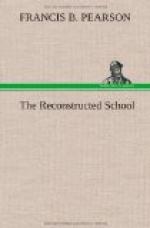Again, a person who is possessed of fine sensibilities sees in the apple tree in full bloom a creation of transcendant beauty and charm. The poet cannot describe it, nor can the artist reproduce it. It is both a mystery and a miracle. Into this miracle nature has poured her lavish treasures of fertility, of rain, of sunshine, and of zephyrs, and from it at the zenith of its beauty the full-throated robin pours forth his heart in melodious greeting. It may be well to dismiss the school to see the circus parade, but even more fitting is it to dismiss the school to see this burst of splendor. In its glorious presence silence is the only language that is befitting. In such a presence sound is discord, for such enchantment as it begets cannot be made articulate. Its influence steals into the senses and lifts the spirit up. To defile or despoil such beauty would be to desecrate a shrine. But the sordid man sees in this symphony of color nothing else than a promise of fruit. His response is wholly physical, not spiritual at all. His spiritual sense seems atrophied and he can do nothing but estimate the bushels of fruit. He feels no respect for the beauty before him and it is evident that somewhere along the line his spiritual education was neglected. He excites our sympathy and our hope that his children may not share his fate.
In the way of illustrating this quality of respect, we reach the climax in the thirty-eighth chapter of the Book of Job and following. The dramatic element of literature here reaches its zenith. God is the speaker, the stricken, outcast Job is the sole auditor, and the stage is a whirlwind. It is related of the late Professor Hodge that, on one occasion when he was about to perform an experiment in his laboratory, he said to some students who stood near, “Gentlemen, please remove your hats; I am about to ask God a question.” But here in this chapter we have a still more sublime situation, for God is here asking questions of the man. And these questions dig deep into the life of the man and show him how puny and impotent is the finite in the presence of the Infinite. In this presence there is neither pomp, nor parade, nor vaunting, nor self-aggrandizement, nor arrogance. Even the printed page cannot but induce respect, devoutness, and profound reverence, for it tells of nature’s wonders—the snow-crystals, the rain, the dewdrop, the light, the cloud, the lightning—and reveals to the bewildered sight some apprehension of the Author of them all.
The reader must, by now, have divined the conclusion of the whole matter. Without respect there can be no reverence; and, without reverence, there can be neither education nor civilization that is worth while. Some one has defined reverence as “that exquisite constraint which leads a man to hate all that is unsuitable and sordid and exaggerated and to love all that is excellent and temperate and beautiful.” This definition is both comprehensive and inclusive,




